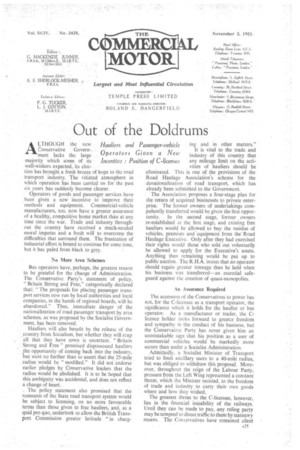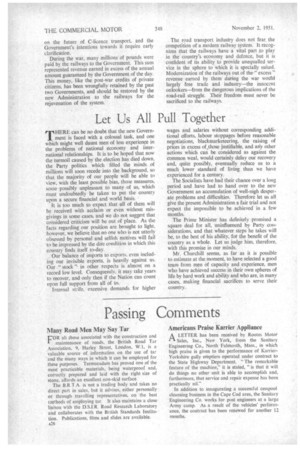Out of the Doldrums
Page 27

Page 28

If you've noticed an error in this article please click here to report it so we can fix it.
ALTHOUGH the new onservative Government lacks the large majority which some of its well-wishers expected, its election has brought a fresh breeze of hope to the road transport industry. The vitiated atmosphere in which operation has been carried on for the past six years has suddenly become clearer.
Operators of goods and passenger services have been given a new incentive to improve their methods and equipment. Commercial-vehicle manufacturers, too, now have a greater assurance of a healthy, competitive home market than at any Lime since the war. Trade and industry throughout the country have received a much-needed moral impetus and a fresh will to overcome the difficulties that surround them. The frustration of industrial effort is bound to continue for some time, but it has paled from black to grey.
No More Area Schemes Bus operators have, perhaps, the greatest reason to be grateful for the change of Administration. The Conservative Party's statement of policy, " Britain Strong and Free," categorically declared that.: "The proposals for placing passenger transport services now run by local authorities and local companies, in the hands of regional boards, will be abandoned." Thus, immediate danger of the nationalization of road passenger transport by area schemes, as was proposed by the Socialist Government, has been removed.
Hauliers will also benefit by the release of the country from Socialism, but whether they will reap all that they have sown is uncertain. "Britain Strong and Free" promised dispossessed hauliers the opportunity of coming back into the industry, but went no further than to assert that the 25-mile .radius would be "modified." It did not endorse earlier pledges by Conservative leaders that the radius would be abolished. It is to be hoped that this ambiguity was accidental, and does not reflect a change of heart.
_ The policy statement also promised that the remnants of the State road transport system would be subject to licensing, on no more favourable terms than those given to free hauliers, and, as a quid pro quo, undertook to allow the British Transport Commission greater latitude "in charg ing and in other matters." It is vital to the trade and industry of this country that any mileage limit on the activities of hauliers should be eliminated. This is one of the provisions of the Road Haulage Association's scheme for the denationalization of road transport, which has already been submitted to the Government.
• The Association proposes a four-stage plan for the return of acquired businesses to private enterprise. The former owners of undertakings compulsorily transferred would be given the first opportunity. In the second stage, former owners re-established at the first stage, and existing free hauliers would be allowed to buy the residue of vehicles, premises and equipment from the' Road Haulage Executive. Only after they had exercised their rights would those who sold out voluntarily be allowed to apply for the Executive's assets. Anything then remaining would be put up to public auction. The RE.A. insists that no operator should regain greater tonnage than he held when his business was transferred—an essential safeguard against the creation of quasi-monopolies.
An Assurance Required The accession of the Conservatives to power has not, for the C-licensee as a transport oper.ator, the significance which it holds for the haulier or bus operator. As a manufacturer or trader, the Clicence holder looks forward to greater freedom and sympathy in the conduct of his business, but the Conservative Party has never given him an unmistakable sign that his Position as a user of commercial vehicles would be markedly more secure than under a Socialist Administration.
Admittedly, a Socialist Minister of Transport tried to limit ancillary users to a 40-mile radius, but was obliged to withdraw this proposal. Moreover, throughout the reign of the Labour Party, pressure from the Left Wing represented a constant threat, which the Minister resisted, to the freedom of trade and industry to carry their own goods where and how they wished, The greatest threat to the C-licensee„ however, lies in the financial instability of the railways. Until they can be made to pay, any ruling party may be tempted to direct traffic to them by statutory means. The Conservatives have remained silent on the future of C-licence transport, and the Government's intentions towards it require early clarification.
During the war, many millions of pounds were paid by the railways to the Government. This sum represented revenue earned in excess of the annual amount guaranteed by the Government of the day. This money, like the post-war credits of private citizens, has been wrongfully retained by the past two Governments, and should be restored by the new Administration to the railways for the rejuvenation of the system. The road transport industry does not fear the competition of a modern railway system. It recognizes that the railways have a vital part to play in the country's economy and defence, but it is confident of its ability to provide unequalled service in the sphere to which it is specially suited. Modernization of the railways out of the-" excess" revenue earned by them during the war wodld largely free trade and industry—the innocent onlookers—from the dangerous implications of the road-rail struggle. Their freedom must never be sacrificed to the railways.




























































































